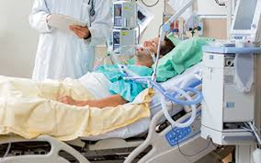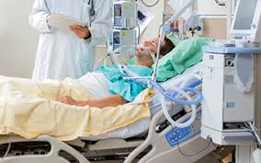Hi, it’s Patrik Hutzel from INTENSIVECAREHOTLINE.COM where we instantly improve the lives for Families of critically ill Patients in Intensive Care, so that you can make informed decisions, have PEACE OF MIND, real power, real control and so that you can influence decision
making fast, even if you’re not a doctor or a nurse in Intensive Care!
This is another episode of “YOUR QUESTIONS ANSWERED” and in last week’s episode I answered another question from our readers and the question was
What Are the Right Questions to Ask the Doctors While My Dad is Critically Ill in the ICU?
You can check out last week’s question by clicking on the link here.
In this week’s episode of “YOUR QUESTIONS ANSWERED” I want to answer questions from one of my clients, Iyah, as part of my 1:1 consulting and advocacy service! Iyah’s dad is in ICU and is ventilated. Iyah is asking why do they need to put her dad in an induced coma in the ICU.
Why Do They Need to Put My Dad in an Induced Coma in the ICU?

You can also check out previous 1:1 consulting and advocacy sessions with me and Iyah here.
Part 1:
Part 2:
Patrik: Hey, Iyah.
Iyah: Hi, Patrik.
Patrik: Okay. So, we will be talking to the ICU doctor or nurse over the phone and ask them questions regarding your dad.
Iyah: Okay.
Patrik: Let’s dial them in.
Remy: Hello, this is Rey. How could I help you?
Iyah: Hi, Rey. My name is Iyah. I’m calling for my dad, in room 98, in
critical care one, just calling her. I just wanted to-
Remy: ICU?
Iyah: I just wanted to call in-
Remy: Yeah.
Iyah: Yeah, regarding my dad’s condition. I have a friend on the phone, his name’s Patrik. He’s an ICU nurse by profession. We just have some questions we want to get clarifications on.
RECOMMENDED:
Remy: Okay. Yeah. And you said your name was, what?
Iyah: Iyah.
Remy: Iyah. Okay. Perfect, perfect. Just making sure you were on the list. Yeah, absolutely. I’m actually his nurse this evening, so you’ve got in touch with the right person.
Iyah: Oh, good.
Remy: And yeah, good Patrik.
Patrik: Hi, how are you?
Remy: Doing well. How about you?
Patrik: Very well, thank you. So you’re the nurse looking after Iyah’s dad?
Remy: I am, yes.
Patrik: That’s fantastic. Thank you for taking care of him. Okay, we’re just trying to understand a bit more about what he’s going through at the moment, so
obviously we can make the right decision going forward.
Remy: Absolutely.
Patrik: I understand he’s in an induced coma at the moment, is that correct?
Remy: Yeah. We do have him on some sedatives right now. Not a huge amount of sedatives, but he is on Precedex, Versed.
Patrik: Right.
Suggested Links:
Remy: Precedex 1.5. Versed is at 1.5 as well.
Patrik: Right.
Remy: So not too much sedation, but he is withdrawing, but that’s about it.
Patrik: Right. So really, not waking up at the moment.
Remy: Yeah. No. You said you were an ICU nurse for a while?
Patrik: Yeah. I’ve worked in ICU for 20 years, so I do have a fair good understanding of what’s happening.
Remy: Awesome. I just wanted to make sure I wasn’t giving you too much or too little information.
Patrik: No, no, no. I will ask.
Remy: You let me know if I’m… Yep, perfect, perfect.
Patrik: Yeah, no, that’s great. That’s great. Why is he sedated at the moment?
Is it just breathing tube/endotracheal tube intolerance? What is it that’s keeping him in that place?
Remy: It is tube intolerance. It’s tube intolerance. Sorry, I’ve been running around just to give you all the right stuff. Yeah, so it is tube intolerance for the most part, and just asynchrony.
Patrik: And asynchrony. Right. Right, I see.
Remy: Yep, yep, just to make he’s on ventilator synchrony.
Patrik: Right. Well there are no issues from a
neurological point of view? Brain is intact as far as you’re aware?
Remy: He is still giving me pupillary reactions, some gag. They’re probably acute metabolic encephalopathy-
Patrik: Right.
Remy: … is kind of what
we’re looking at with that. However, he has had periods of agitation, so we’ve been having to give Zyprexa once or twice, but it was working, and went well. And then he does have that baseline previous stroke on-
Patrik: Yes. Yes. Yes.
Remy: … The
other thing, yeah, the right side is weaker in everything.
Iyah: The left side is yeah? The left side is weaker.
Remy: Yeah, left. Left, yes.
Patrik: Right, I see. And what happens-
Remy: Yeah left side, yeah. The left side moves, and then the right side…
Sorry, sorry, yeah, yes, withdraw is the left side, and the right side is block.
Patrik: And what happens if you take sedation off, is he still breathing against the ventilator is he?
Remy: Yes. Yeah. And we have been doing daily awakening trials for minutes to make him … But yeah, he’s still been needing the sedation.
Patrik: I see. I see. Okay. And with the metabolic
encephalopathy, what do you relate that back to? Where’s the metabolic disturbance coming from?
Remy: The metabolic encephalopathy?
Patrik: Yes.
Remy: Is that what you’re asking? The phone is not very-
Patrik: Yes, yes.
Remy: Yeah. So it’s definitely partially related to just the medication he’s getting and secondary metabolites. But he is also experiencing fluid overload, he’s anuric with renal failure, so he’s still having all of the
stuff, not excreting it.
Patrik: Oh, okay.
Remy: We have him on dialysis, but even so, that stuff does build up. Yeah, because he’s totally anuric, he’s not putting anything out on his own.
Patrik: Right. That makes
sense.
Suggested Links:
Remy: And then, he did have a positive blood culture today. They’re poked it out further, with some gram-positive cocci.
Patrik: Right.
Remy: So, it could possibly be related to sepsis and things like that with it as well.
Patrik: Of course. Of course. And with him being anuric, is he on dialysis, or on hemofiltration?
Remy: Yes. Yes.
Patrik: Right.
Remy: Yes, he’s on hemodialysis. Yep.
Patrik: Right. Okay. Okay, that’s great. That’s great. And then, so moving along, is he hemodynamically stable?
Remy: He’s
doing all right hemodynamically. His last blood pressure was 125 over 62, heart rate up in the 80s, up to 90, so a little bit tachycardic earlier today, at 129. But mostly hemodynamically looking all right.
Patrik: No vasopressors, no inotropes?
Remy: No, no pressors on right now. He was getting some norepinephrine, until the 22nd.
Patrik: Right. Okay, that’s great. And with the infection/sepsis, does he have a temperature?
Remy: He did, two days
ago.
Patrik: Right.
Remy: His most recent was 99.4, so right on the edge.
Patrik: Right.
Remy: So, nothing too high, but it’s still definitely a low fever.
Patrik: Sure. And his
white cell count is off, or normal?
Remy: His most recent white cell is actually looking pretty okay at 7.3.
Patrik: Okay.
Remy: But yeah…
Patrik: So really, that doesn’t sort of indicate there is a sepsis. I mean, you mentioned earlier gram-positive cocci. I mean, if his white cell count is fine, he’s afebrile, he’s not on pressors, not a real septic picture, is it?
Remy: No. It would be the beginning.
Patrik: Right.
Remy: It’s not, yeah, full-blown. It’s just we’re seeing that, so we have his own broad-spectrum, and dialysis right now. For the cultures, we’re going to get to something more
specific.
Patrik: Right. I see. I see. And with the blood results in general, are there any concerns with other blood results, like hemoglobin, or… I would imagine urea and BUN (Blood Urea Nitrogen) would be off?
Suggested Links:
Remy: Yeah, yeah, creatinine’s 2.9, BUN’s at 79. And then, a little low on his sodium, 135. Calcium is a 5.2. Magnesium and phosphorus is 5.7. So, of course with those, that’s why we’re doing the dialysis, trying to clean it out.
Patrik: Yes. Yes.
Remy: Yeah, and then his hemoglobin and hematocrit is 8.5 and 26, so on the low side, but still functional.
Patrik: Right. I see. And the hemoglobin is stable?
Remy: Yeah. Let me look at the full trend here.
Patrik: Thank you.
Remy: Yeah, of course, of course. It actually is looking a little better. It was at 7.2 as of the morning of the 24th, and then the morning of today it was at
8.5.
Patrik: Right. Okay. Okay.
Remy: And that was after around of HD (Hemodialysis), so some fluid off. It was probably delusional anemia a little bit too.
Patrik: Right, right, right. Yes, of course. Of course.
So trending downwards a little bit. But has he had any blood transfusions in recent days?
Remy: Let me double-check. The outgoing nurse didn’t mention anything, but I will just make sure. It looks like the last one was completed on the
11th, so yeah, nothing recent.
Patrik: Nothing… Okay, that’s great. That’s great.
Iyah: Oh, actually, I’m sorry, sorry. I do recall a couple days ago he did have a blood transfusion of red blood cell.
Remy: Let me get
through the whole documentation in here. Do you remember what day that was mentioned to you?
Iyah: A couple days ago, but I recall that. I’m trying to go back to another one so that…
Remy: Yeah, no, for sure, for sure. I’m going to get to the day.
Iyah: Yeah it’s Friday.
Remy: Friday?
Iyah: Right.
Remy: Let me take a
quick prick for the-
Iyah: blood gas.
Suggested Links:
Remy: Sorry, it is taking a moment to load up-
Patrik: That’s okay. Thank you. Thank you.
Iyah: No worries. No worries.
Remy: Looks like on the 23rd we gave him some…
Patrik: Right. Right. Okay.
Iyah: It was on the day of the 23rd also.
Remy: Yeah. Yeah.
Iyah: I think it was in the morning.
RECOMMENDED:
Remy: Just to inform you, I’m writing down the most recent… Yeah, on the 23rd we gave some platelets.
Patrik: Okay. And can I just ask, so with the sedatives that he’s on, what ventilation settings is he on at the moment?
Remy: He is on VC/AC (Volume Control/Assist Control Mode), with CMV (Continuous Mandatory Ventilation).
Patrik: Yeah. And FiO2 (Fraction of Inspired Oxygen)?
Remy: FiO2 right now is running at 50, PEEP (Positive End Expiratory Pressure) of
10.
Patrik: Yep.
Remy: Rate is set at 16, but he is over breathing. Last hour he was up at 24. He’s been up in the mid-20s all day.
Patrik: Right. And target volumes (Tidal Volumes) are adequate for what
you’re looking for?
Remy: Yeah. He’s set to 380 right now, and it hasn’t been too much lower than that, 350 to 380 is right around where we’re seeing.
Patrik: Right. And you’re happy with the ABGs (Arterial Blood Gas)?
Remy: Let me look up yesterdays.
The 1:1 consulting session will continue in next week’s episode.
Kind regards,
Patrik
PS
I only have one consulting spot left for the rest of the week, if you want it, hit reply to this email and say "I'm in" and I'll send you all the details.
phone 415- 915-0090 in the USA/Canada
phone 03- 8658 2138 in Australia/ New Zealand
phone 0118 324 3018 in the UK/Ireland
Skype patrik.hutzel
If you have a question you need answered, just hit reply to this email or send it to me at support@intensivecarehotline.com
Or if you want to be featured on our PODCAST with your story, just email me at support@intensivecarehotline.com
phone 415-915-0090 in the USA/Canada 

phone 03 8658 2138 in Australia/ New Zealand 
phone 0118 324 3018 in the UK/ Ireland 

Phone now on Skype at patrik.hutzel
Patrik Hutzel
Critical Care Nurse
Counsellor and Consultant for families in Intensive Care
WWW.INTENSIVECAREHOTLINE.COM






